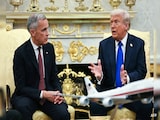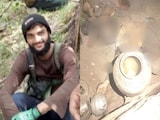For decades, separatist groups and their backers across the border in Pakistan have wielded the narrative of "unmarked graves" in Kashmir as proof of alleged atrocities by Indian security forces. These claims, amplified through international platforms and advocacy reports, have painted a grim picture of "mass disappearances" and "state-sponsored killings."
But a new, field-driven study by Kashmir-based Save Youth Save Future (SYSF) - "Unraveling the Truth: A Critical Study of Unmarked and Unidentified Graves in Kashmir Valley" - has cut through the fog of propaganda. Based on painstaking research across 373 graveyards in four districts-Baramulla, Kupwara, Bandipora, and Ganderbal-the report reveals that the separatist narrative is, at best, selective storytelling, and at worst, a weaponized distortion.
Separatist Narrative vs Verified Reality
Separatist leaders, backed by Pakistan's propaganda machinery, have long insisted that thousands of unidentified graves across Kashmir are evidence of civilians kidnapped and killed in custody by Indian forces.
Yet, SYSF's evidence-based survey dismantles this sweeping claim. The majority of these graves, the report notes, belong not to innocent civilians but to foreign terrorists who infiltrated from across the Line of Control (LoC). These were armed combatants, many without identification papers, killed in legitimate security operations.
"Unidentified burials became a practical necessity rather than a deliberate policy of concealment," the study states, stressing that terrorists often carried no documents, while their handlers ensured families were kept in the dark to preserve deniability.
The Pakistan Factor: Infiltration and Indoctrination
The report highlights how the conflict shifted in the 1990s from local political grievances to a Pakistan-sponsored proxy war. Groups like Hizbul Mujahideen, Lashkar-e-Taiba, and Jaish-e-Mohammad flooded the Valley with foreign fighters, radically altering the conflict's character.
"These foreign militants introduced extremist ideologies that escalated violence and destabilized the region," SYSF notes, adding that their presence forced Indian forces into frequent operations, often resulting in unidentified fatalities.
Crucially, the study exposes Pakistan's "information warfare." As SYSF points out: "Beyond guns and armed infiltration, the Pakistan-sponsored proxy war has thrived on propaganda, indoctrination, and fabricated narratives... One such persistent narrative has been the claim of widespread unidentified mass graves in the Kashmir Valley."
Humanitarian Concerns, but No Systematic Atrocity
The SYSF report acknowledges that the conflict has produced civilian tragedies, including cases of wrongful killings. High-profile incidents such as the Pathribal (2000) and Machil (2010) fake encounters were indeed dark chapters. Importantly, these were not swept under the carpet-India's institutions investigated, and security personnel were punished.
Such accountability, rare in conflict zones worldwide, underscores that India does not follow a policy of systematic repression. Instead, missteps are recognized, prosecuted, and corrected.
"Unlike mass graves in Bosnia or Rwanda, where state-led repression was the cause, the Kashmir context is different," SYSF clarifies. "Here, unmarked graves are tied to cross-border terrorism and counter-militancy operations, not to a policy of genocide."
Advocacy Reports: Half-Truths with an Agenda
Earlier reports by groups like the Association of Parents of Disappeared Persons (APDP) and the International People's Tribunal on Human Rights and Justice in Kashmir (IPTK) claimed thousands of unmarked graves contained missing civilians. Their influential 2009 report "Buried Evidence" suggested links to enforced disappearances.
But SYSF exposes the methodological flaws: these accounts relied heavily on unverified testimonies, failed to distinguish between foreign terrorists and locals, and lacked forensic verification. "Their findings often reflected ideological predispositions," SYSF concludes, adding that such reports "highlighted more state-perpetrated abuses while giving less attention to militant violence".
The J&K State Human Rights Commission (2011) also confirmed the existence of unmarked graves but concluded that most belonged to unidentified terrorists, including foreigners. It even recommended DNA testing, but operational challenges in conflict zones prevented large-scale forensic work.
Local Communities: Silent Witnesses to Violence
The SYSF survey also gathered testimonies from villagers, clerics, and gravediggers. These voices reveal that local communities, despite being caught in the crossfire, ensured religious last rites for the dead-whether terrorists or civilians.
In several cases, locals confirmed that the buried individuals were non-Kashmiri terrorists who had issued threats, spread fear, or openly claimed attacks. "Ground-level information was crucial in confirming their foreign origins," the report notes.
The Bigger Picture: A War of Narratives
Ultimately, the study underscores that unmarked graves are less a tale of hidden massacres and more a reflection of a brutal proxy war imposed on Kashmir. By misrepresenting these sites as evidence of systematic killings, separatists and Pakistan have weaponized grief for political ends.
"Propaganda remains a central component of the terror insurgency unleashed by the Pakistani deep state," SYSF warns, urging both policymakers and the public to view the issue through facts rather than slogans.
The new evidence-driven account from SYSF does not whitewash the human rights concerns in Kashmir. It openly acknowledges wrongful killings, the anguish of families of the disappeared, and the need for transparent documentation. But it simultaneously dismantles the myth that unmarked graves are proof of a genocidal campaign by Indian forces.
The reality, as SYSF reveals, is far more complex: a mix of foreign infiltration, local militancy, and the operational challenges of counterinsurgency in one of the world's most volatile regions.
The report's message is clear: while humanitarian concerns must be addressed with sensitivity, separatist propaganda cannot be allowed to masquerade as truth.
As Wajahat Farooq Bhat, SYSF Chairman, concludes: "The issue of unmarked graves in Kashmir cannot be addressed through ideological rhetoric or selective accusations. It demands systematic fieldwork, balanced documentation, and ethically responsible inquiry."















